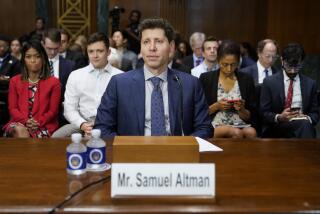Fed’s Bernanke wanted to block AIG bonus payments
- Share via
JIM PUZZANGHERA AND WASHINGTON — A congressional hearing intended to put the nation’s top economic policymakers on the hot seat over bonuses paid to employees of American International Group Inc. turned instead into a preview of the Obama administration’s effort to revamp the powers of federal regulators.
Treasury Secretary Timothy F. Geithner and Federal Reserve Chairman Ben S. Bernanke told Congress on Tuesday that the government needed broad new powers to seize and dismantle large financial institutions that could seriously damage the entire economy should they collapse.
“AIG highlights broad failures of our financial system,” Geithner said. “Our regulatory system was not equipped to prevent the buildup of dangerous levels of risk.”
The call for greater authority, which President Obama raised last week, would be a major expansion of government power in the economy, echoing the wide authority granted to Washington during the Great Depression.
Geithner said such power would be part of a new financial regulatory framework that he would outline Thursday and that also could include tougher limits on executive compensation.
The Federal Deposit Insurance Corp., created in 1933, has the ability to seize failing banks and sell their assets, as it did last summer with IndyMac Bank in Pasadena. But the government has no authority or mechanism to seize other types of financial institutions, such as giant insurer AIG, which is why the Fed stepped in last September with an unprecedented $85-billion loan to keep the company from failing.
The Fed and Treasury have since expanded bailout commitments to AIG to as much as $182.5 billion and share responsibility for overseeing the government’s 80% stake in the company.
“If a federal agency had had such tools on Sept. 16, they could have been used to put AIG into conservatorship or receivership, unwind it slowly, protect policyholders and impose haircuts on creditors and counterparties as appropriate,” Bernanke told members of the House Financial Services Committee. “That outcome would have been far preferable to the situation we find ourselves in now.”
Bernanke and Geithner, under fire for not stopping $165 million in bonuses to employees of the AIG unit that led to the company’s downfall, tried to seize the initiative at a hearing designed to probe those controversial payments.
They answered tough questions on the bonuses -- Bernanke saying he had wanted to sue to stop them -- then used the New York company as Exhibit A for the need for expanded government authority to prevent a similar mess in the future.
Bernanke said the new authority could be given to the FDIC. Geithner suggested it could be given to the Treasury Department, in conjunction with the Federal Reserve and the White House.
The new authority probably would be coupled in some way with another new regulatory initiative the administration has discussed in recent weeks -- a government entity to monitor the economy broadly for systemic risks that regulatory agencies can’t identify. Regulators oversee only portions of the financial system.
On Monday, the Treasury Department and Fed issued a joint statement calling for the Fed to play “a central role” in conjunction with other agencies in preventing and managing financial crises.
Bernanke said “strong, effective, consolidated supervision of all systemically important firms” could avoid a repeat of the AIG situation.
Obama said he hoped it wouldn’t take too long to convince Congress of the need for the new powers to deal with large companies on the brink of failure.
“Keep in mind that it is precisely because of the lack of this authority that the AIG situation has gotten worse,” Obama said during Tuesday’s nationally televised news conference. “If it were a bank and it had effectively collapsed, then the FDIC could step in . . . and in a structured way renegotiate contracts, get rid of bad assets, strengthen capital requirements, resell it on the private marketplace.”
The House committee’s chairman, Rep. Barney Frank (D-Mass.), endorsed the idea.
“When nonbank, major financial institutions need to be put out of their misery, we need to give somebody the authority to do what the FDIC can do with banks,” he said, promising to work with the administration to craft legislation. House Speaker Nancy Pelosi (D-San Francisco) and Senate Majority Leader Harry Reid (D-Nev.) signaled their support as well.
In recent weeks, other lawmakers, such as Sen. Bob Corker (R-Tenn.), have expressed surprise and concern that federal officials have no authority to seize struggling large companies, such as AIG or General Motors Corp., that pose a major risk to the economy, so they can be restructured or dismantled in an orderly fashion.
But some Republicans weren’t ready Tuesday to grant the new authority. House Minority Leader John A. Boehner (R-Ohio) called it “an unprecedented grab of power.”
Geithner and Bernanke defended their handling of the AIG bonuses. Bernanke said he had sought to file a lawsuit to prevent the payments but backed off after learning it could wind up doubling the bonuses if employees sought punitive damages.
“Legal action could thus have the perverse effect of doubling or tripling the financial benefits to the [AIG] employees,” Bernanke said.
Geithner acknowledged there were news reports about AIG’s retention bonuses earlier this year. But he said he “was not aware about the details of the payments or their legal nature” until March 10. Geithner tried to get AIG Chief Executive Edward Liddy to stop the bonuses, but allowed them to be paid by March 15 after being told the company had contracted with employees early last year to pay the bonuses.
Geithner also said Treasury staff members interceded with Sen. Christopher J. Dodd (D-Conn.) when the economic stimulus bill was being firmed up last month and “expressed concerns” that his executive compensation provision could be “vulnerable” to legal challenges because it applied retroactively to bonuses. The provision was changed to exempt any payments contracted before Feb. 11.
Dodd has said he changed the provision at the Obama administration’s request.
Geithner said the Treasury and Justice departments were looking for ways to recoup the bonuses from the employees. But Geithner also tied the bonus issue to the need for broader restrictions on executive compensation.
“This issue of executive compensation extends beyond AIG and requires reform of the system of incentives and compensation throughout the financial sector,” he said.
--
More to Read
Inside the business of entertainment
The Wide Shot brings you news, analysis and insights on everything from streaming wars to production — and what it all means for the future.
You may occasionally receive promotional content from the Los Angeles Times.











